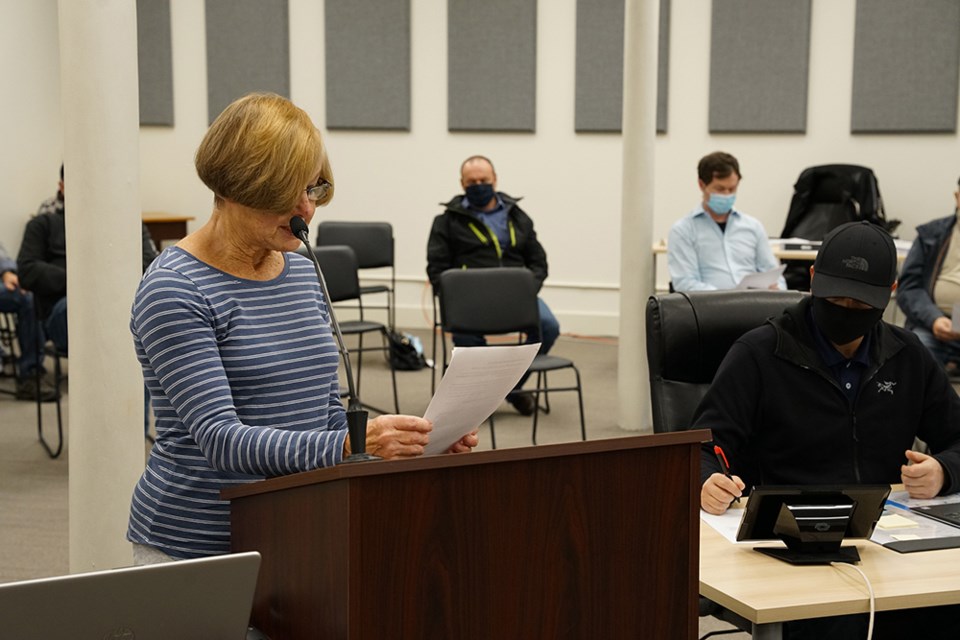City of Powell River councillors were urged to give second thought to the initiative to consider changing the name of the city.
At the November 16 committee of the whole meeting, Vivian Thickett appeared as a delegation and said her purpose for speaking to councillors was to present three important reasons why changing the name of Powell River is unjustified and unnecessary.
“First of all, is changing the name part of truth and reconciliation?” asked Thickett. “True reconciliation is about forgiveness and moving forward. We are not responsible for the actions of our ancestors. Changing the name will not atone for the past. This is the whim of a small minority. There needs to be community meetings, inviting the whole general population. Informative, factual information needs to be presented.
“A referendum will settle the issue in the most democratic process. All these actions need not require months and months of lengthy discussions at our, the taxpayers’, expense.”
Thickett said her second point pertained to Israel Powell, after whom Powell River was named. She said it is important for those in Powell River to be aware of some details she specified during her presentation.
“In his lifetime, Israel Powell accomplished many positive things and was a pioneer of our province,” said Thickett. “Powell advocated responsible government, free public schools, he supported confederation and was responsible for British Columbia joining confederation.
“For 17 years, Powell was superintendent of Indian affairs. He was a constant critic of both the provincial and federal governments’ resistance to providing aboriginal land and water rights. He fought for the establishment of reserves, believing these would help the Indians initiate a stronger economic base than what was in effect.”
Thickett said in the beginning of the 1870s, the federal government and plains nations wanted to include schooling provisions for Indigenous children in treaties.
“As an aside here, very few people know that Indigenous leaders in the 1870s asked the federal government to include their children in the schooling system of the day,” said Thickett. “Indigenous leaders hoped schooling would help their young to learn the skills of a newcomers’ society. With the passage of the British North America Act in 1867, and the implementation of the Indian Act in 1876, the government was required to provide Indigenous youth an education and to assimilate them into Canadian society. The federal government supported schooling as a way to make first nations economically self-sufficient. The underlying objective was to decrease Indigenous dependence on public funds.”
Thickett said the federal government collaborated with Christian missionaries to lead to the development of custodial schools. The first residential school, she said, was established on the prairies in 1883 and it was half a century, in the mid-1930s, before these custodial schools were in full operation across Canada. Mandatory attendance at these schools for children aged seven to 12 began in 1920, continued Thickett.
Powell retired in 1889, six years after the first residential school was established, and died in 1915, said Thickett.
“It is evident from the factual timeline that Israel Powell could not possibly have had anything to do with the future residential school wrongdoings that occurred in the mid-1900s and later,” said Thickett.
She said changing the city’s name would incur another burden on the beleaguered municipal budget. She said council has already allocated $20,000 from a general unappropriated surplus to fund this project.
“There will, and undoubtedly have been, legal costs, correspondence costs and meeting costs,” said Thickett. “Will we need to change our birth certificates, marriage certificates, and driver’s licences? Increased municipal spending ultimately becomes the local taxpayers’ burden.
“Moving forward in true reconciliation, these name changing decisions should be achieved with full transparency from municipal council and full community input,” said Thickett. “In closing, there seems to be no justifiable reason to change the name of Powell River.”
Elliott favours inclusive process
Councillor Cindy Elliott said it was an emotional topic for her. She said she knows the name of the city is important to everybody.
“To be open to reconciliation means we are open to having a conversation when asked,” said Elliott. “Making a determination prior to having that conversation, and determining the name should not be changed, is not an open approach to requests that come from Tla’amin Nation.”
Elliott said the points Thickett made about Powell are not complete.
“I agree, we do need to talk about it,” said Elliott. “We need to hear in an open way, which can’t be done by social media or a referendum. It needs to be done where we facilitate a conversation that everyone is welcome to be part of, and we listen to one another.
“I’m in favour of an inclusive process that may take a bit of time so that we hear one another and make sure we get it right. We need to be open to the idea that our name might change.”
Mayor Dave Formosa said the initiative to rename the city was not something the council decided to do. He said that Tla’amin Nation made a formal request to change the city’s name.
“What we are trying to achieve is to have, as councillor Elliott said, a conversation and education process, inclusive with the First Nation people and the people of the City of Powell River,” said Formosa. “We can hear from our neighbours and friends at Tla’amin the pain they feel when they see and hear the name. If this is truly something that is hurtful to them, it’s becoming of us to have a good look at it and to have a good discussion, community to community.”




